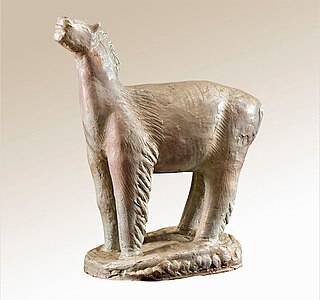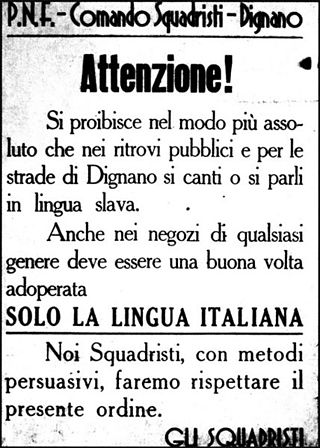Eduardo Blasco Ferrer was a Spanish-Italian linguist and a professor at the University of Cagliari, Sardinia. He is best known as the author of several studies about the Paleo-Sardinian and Sardinian language.

Sardinian or Sard is a Romance language spoken by the Sardinians on the Western Mediterranean island of Sardinia.

Sassarese is an Italo-Dalmatian language and transitional variety between Sardinian and Corsican. It is regarded as a Corso–Sardinian language because of Sassari's historic ties with Tuscany and geographical proximity to Corsica. Despite the robust Sardinian influences, it still keeps its Corsican roots, which closely relate it to Gallurese; the latter is linguistically considered a Corsican dialect despite its geographical location, although this claim is a matter of controversy. It has several similarities to the Italian language, and in particular to the old Italian dialects from Tuscany.
The primary languages of Calabria are the Italian language as well as regional varieties of Extreme Southern Italian and Neapolitan languages, all collectively known as Calabrian. In addition, there are speakers of the Arbëresh variety of Albanian, as well as Calabrian Greek speakers and pockets of Occitan.

Arturo Martini (1889–1947) was a leading Italian sculptor between World War I and II. He moved between a very vigorous classicism and modernism. He was associated with public sculpture in fascist Italy, but later renounced his medium altogether.

Giovanni Domenico Nardo was an Italian naturalist from Venice, although he spent most of his life in Chioggia, home port of the biggest fishing flotilla of the Adriatic. He learned taxidermy and specimen preparation from his uncle, an abbot. He went in a high school in Udine and studied medicine in Padua, where he reorganized the zoological collections. In 1832 he reorganized the invertebrate collection at the Imperial Natural History Museum in Vienna and in 1840 he became Fellow of the Istituto Veneto di Scienze, Lettere ed Arti, an academy whose aim is "to increase, promulgate, and safeguard the sciences, literature and the arts". Nardo wrote hundreds of scientific publications ranging from medicine and social sciences, philology, technology, physics, but mostly on Venetian and Adriatic zoology. In marine biology, Nardo wrote on algae, marine invertebrates, fishes and sea turtles. A vast collection of his manuscripts and his personal library is preserved in the Natural History Museum of Venice.

Giovanni Filoteo Achillini was an Italian philosopher.

Frabosa Sottana is a comune (municipality) in the Province of Cuneo in the Italian region Piedmont, located about 90 kilometres (56 mi) south of Turin and about 20 kilometres (12 mi) southeast of Cuneo. The economy is based on winter tourism, based on the nearby ski resort of Prato Nevoso.

Italianization is the spread of Italian culture, language and identity by way of integration or assimilation. It is also known for a process organized by the Kingdom of Italy to force cultural and ethnic assimilation of the native populations living, primarily, in the former Austro-Hungarian territories that were transferred to Italy after World War I in exchange for Italy having joined the Triple Entente in 1915; this process was mainly conducted during the period of Fascist rule between 1922 and 1943.

Alfredo Trombetti, was an Italian linguist active in the early 20th century.

Francesco Mancini was an Italian painter whose works are known between 1719 and 1756. He was the pupil of Carlo Cignani.

The Sardinians, or Sards, are a Romance language-speaking ethnic group native to Sardinia, from which the western Mediterranean island and autonomous region of Italy derives its name.
Giovanni Francesco Fortunio was an Italian grammarian, jurist and humanist.
Lorenzo Renzi, Italian linguist and philologist.
Giovanni Mario Alessandri was an Italian Hispanist and grammarian from the 16th century.

Giovanni Rucellai, known as Giovanni di Bernardo Rucellai, was an Italian humanist, poet, dramatist and man of letters in Renaissance Florence, in Tuscany, Italy. A member of a wealthy family of wool merchants and one of the richest men in Florence, he was cousin to Pope Leo X and linked by marriage to the powerful Strozzi and de' Medici families. He was born in Florence, and died in Rome. He was the son of Bernardo Rucellai (1448–1514) and his wife Nannina de' Medici (1448–1493), and the grandson of Giovanni di Paolo Rucellai (1403–1481). He is now remembered mostly for his poem Le Api, one of the first poems composed in versi sciolti to achieve widespread acclaim.
The Accademia Fiorentina was a philosophical and literary academy established in Florence in the Republic of Florence during the Italian Renaissance. It was active from 1540 to 1783.
Nicoletta Maraschio is an academic teacher of "History of Italian Language" at University of Florence. She was the first woman in charge of Accademia della Crusca, from 2008 to 2014, succeeding Francesco Sabatini.

Ligurian cuisine consists of dishes from the culinary tradition of Liguria, a region of northwestern Italy, which makes use of ingredients linked both to local production, and to imports from areas with which, over the centuries, the Ligurians have had frequent trade.
Adriano Politi was an Italian translator, philologist and classical scholar. He belonged to the Sienese School of philologists.











